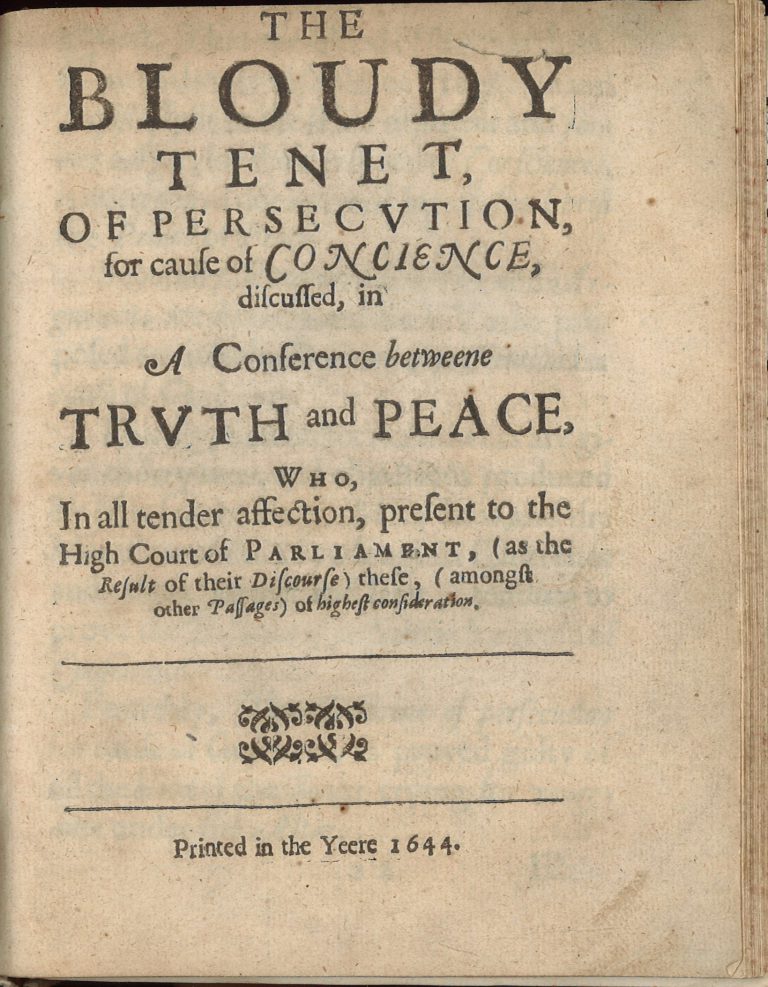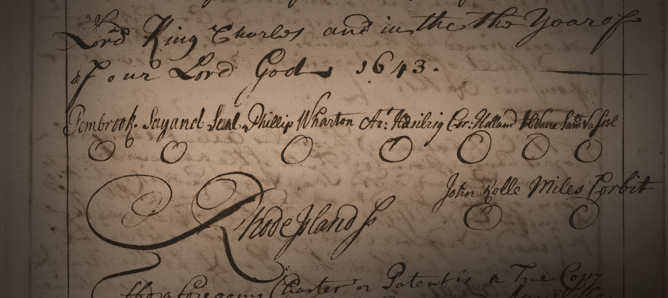Was Roger Williams a separatist? The short answer is yes if your definition is the 17th century separatist movement which wanted to separate from the Church of England. “Separatism” in his time primarily referred to religious and church-state separation rather than the broader, sometimes racial or ethnic, connotations it has today.
For the story of Roger Williams, check out his biography: Roger Williams Biography and Dedication to the Freedom of Conscience. For a visual timeline of his life, check out the Roger Williams Timeline. For now, though, let’s zoom in on his adopted religions.
I think it is fair to say Roger was a Protestant from a young child, he was ordained a Protestant Anglican Minister in 1629 in London, England, and became a separatist by the time he left England for the Massachusetts Bay Colony arriving in February 1631. In 1639 he completely separated from the Protestant religion when he became a seeker. He briefly converted to baptism and founded the first baptist church in America. His role in founding the first Baptist church in America was part of a broader spiritual journey that saw him advocating for religious freedom beyond any single denomination.

Weekly Wisdom Builder
Got 4 minutes a week?
A new 4-minute thought-provoking session lands here every Sunday at 3PM, emailed on Mondays, and shared throughout the week.
Exactly what the world needs RIGHT NOW!
Modern Definition of Separatist
If you use the modern definition of separatist that includes intolerance of others, then Roger Williams was not a separatist. Furthermore, he supported all people living, and working together in the same community for the common good. Sometimes people forget the context of the time and conflate his desire to separate from the Church of England run by the government with the separatist movement based on races. I think some with a desire to promote white supremacy do this on purpose.
Let’s explore…
A separatist is a person who supports the separation of a particular group of people from a larger body on the basis of ethnicity, religion, or gender. For the sake of this article, I will use Racial Separatist for this full definition. Why? Because Roger Williams did advocate for separating from the Church of England on religious grounds which has caused much confusion and is frequently conflated to paint him as a racist.
Roger Williams wanted to separate from the formal government run Church of England because of valid reasons. Just because you separate from something does not mean you are a Racial Separatist. Many say Roger Williams was a staunch separatist because he wanted to separate from the Church of England. He didn’t want to separate, he wanted to change it. He wanted to separate from the formal government run church as a form of protest because it was government run, and required all, even non-believers, to support the church. Furthermore, they burned heretics at the stake. He was for the individual freedom of and from religion. He spoke out against persecution for the crime of thinking and believing something. After he failed to change the Church of England from within as a puritan, he separated from it so he could continue to speak out. Furthermore, over his lifetime, he did change the church! He exercised his conscious, not advocating for the Racial Separatist movement.
Williams Lived with Native Americans Tribes
In January 1636, Roger Williams left the Massachusetts Bay Colony and lived with two local tribes for about a half year. During that time, he worshipped, and if anyone wanted to worship with him, they were welcome. But, he did not force his religion on anyone.
Jewish Settlers Welcomed at Providence
Roger Williams welcomed Jewish settlers in his community. He did not say they had to live elsewhere. Roger Williams even visited with them in Newport.
In 1644, in his book, Bloody Tenent, he remarked that Jews:
“may be clear and free from scandalous offences in their life, as also from disobedience to the Civil Laws 0f a State”
In 1655, Roger Williams wrote a letter in response to the charge that he advocated infinite liberty of conscience. The story in the letter has become known as the Parable of the Ship. His famous parable is a short story in which papists, protestants, Jews, and Turks all live and work together for the common good.
To learn more, check out my articles on the Parable of the Ship and Separation of Church and State.















